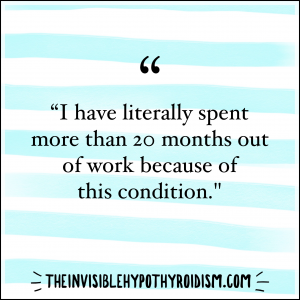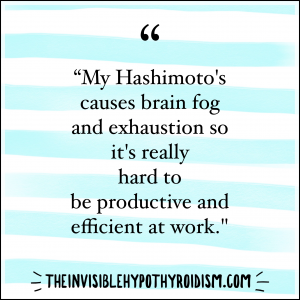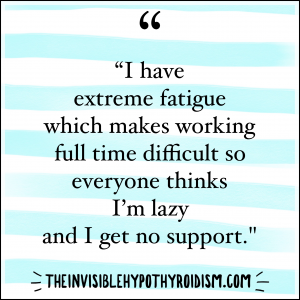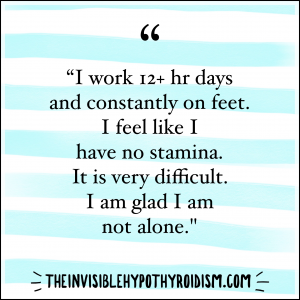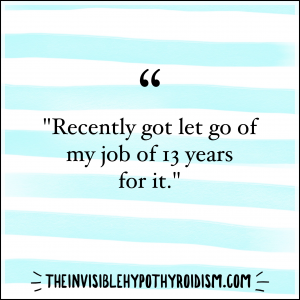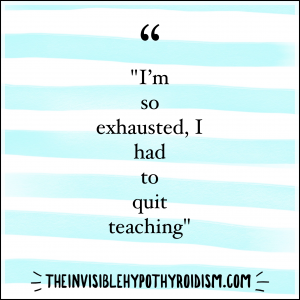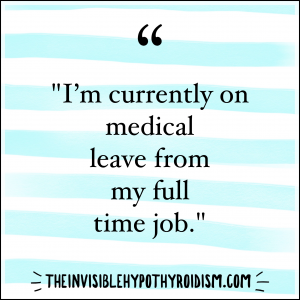Many people around the world with thyroid conditions such as hypothyroidism and Hashimoto’s are struggling at work.
My work has been one of the most affected areas of my life since having thyroid issues. Brain fog has made it hard to work efficiently, heavy fatigue has led to me falling asleep at my desk and poor mental health caused by my thyroid condition meant that panic attacks would interrupt work tasks.
So, I asked followers of my Instagram page how thyroid disease may have affected their work and the response was overwhelming. I knew that others must struggle with this aspect of their life too, but didn’t realise just how many of us are truly devastated in this way.
Comments have been kept anonymous as many would rather their work colleagues not know these experiences or feelings.
“I have been signed off work from work by the GP several times due to the physical and mental effects of my thyroid condition. I felt like a failure.”
“My exhaustion makes it hard to always go to work even though I work in my home. Oftentimes I find it hard to get through the day, especially fast-paced days. The exhaustion also brings on a lot of anxiety I think, which causes a whole new level of getting to and staying at work.”
“I ache all over at times and also feel my arthritis is because of my Hashimoto’s. Whoever works full time with this condition deserves a medal!”
“It was so awful that I considered leaving the Army because it was so bad. The worst part was that my two supervisors thought I was faking because I looked “OK” to them. It was tough. Once I had my thyroidectomy, it was a different set of symptoms but they now affect me on and off.”
“The worst part isn’t the brain fog or the extreme fatigue – the worst part is how your coworkers just cannot understand it. I am fortunate to work in a loving environment – but some days I feel like I’m stumbling over my words and cannot get my brain to click on. There have been a lot of embarrassing times where my coworkers think that my tongue twisters are so funny but to me it’s humiliating because I literally have no control over it. I’ve tried caffeine, I’ve tried going to be earlier but nothing seems to help my brain turn on quicker.”
“Memory loss or brain fog has been a battle for me at work. I write everything down and request emails to help. But co workers don’t believe they should email me if they walk by my desk to tell me. So frustrated. They think it’s because I’m twenty years older than them but it’s not. I get tired of explaining why. I almost made a poster for my area but decided not to go there.”
Related Article: Thyroid Patients Describe How Thyroid Brain Fog Feels To Them
“What probably bothers me most is that I have a hard time staying focused in a conversation or meeting. After ten minutes, I just space out no matter how hard I try to prevent it. Ugh!! It’s hard as it is keeping up with the men in my profession but this disease is making it even harder!”
“I got let go from a job as I was consistently making mistakes due to brain fog.”
“Between the brain fog and the fatigue, I barely manage to make it through a week of work! There is almost nothing left for my family when I am done with work. Thankfully, my coworkers are understanding as most of them have some form of an invisible illness. It’s one of the only reasons I stay with the small company I work for.”
“Anxiety and depression making it hard to focus and multitask multiple jobs/responsibilities. Brain fog making you not think right/forgetting when you changed your work schedule last minute therefore not showing up to work at the right time… very very rare but has happened. I hate Hashimoto’s for affecting my life everyday/stopping me from being the best version of me.”
“Just started a new job where set up means practically no working from home plus train travel daily…. I have felt it big time, feeling drained and like I’m not up to the role (I’m a mum of two kids too). My body’s adjusting slowly to the new schedule and influx of new info but the Hypothyroidism has definitely been raising its ugly head for the last few weeks fatigue, brain fog and anxiety – struggling to tell the difference between stuff I can’t grasp which is down to just being new or the actual thyroid! Just being kind to myself though instead of pulling myself down and trying to do light exercise where possible!”
“Some days I can’t make it out the door without breaking down, I call my husband and he reassures me and helps me as much as he can. At work I struggle with getting through the day, feeling tired, bloated, mentally drained. People think because I’m young that I’m fit and healthy so give me the ‘run upstairs’, ‘take this down to..’ but come lunch time, I just want to sit down and not even speak to anyone. When I get home all I want to do is have a hot bath and sit on the sofa in my pjs just ignoring the world. Most days I have a constant headache, I forget what I was going to say in a conversation or what I was asked to do. I feel so guilty when I call in sick. At the moment I can get about a month until I have such a bad day and can’t go in. But it’s making work hard because no one understands. They just think I’m pulling a ‘sicky’, I mean I wish I was! I wish I felt human enough to actually have a day off work and feel human!”
“I fear work might not be as understanding because they don’t live this and it’s not easy to show someone how your body is functioning- or not functioning in our case. It takes me a good hour at my desk to become ready from waking up and getting to work. Then I can be on task for an hour or so and my brain fogs up. I’m off task, my mind wants rest, my body wants sleep. Lunch comes around and I go to yoga. Come back and eat. I’m good to go for another hour and the the afternoon exhaustion hits. No productivity, or little. I’ve been making more mistakes lately, things I would never normally make. It sucks a lot.”
“I can’t work in my desired field because I am so sick and tired all the time. At age thirty I thought I’d have a nice career and life, but I’m just working a part-time job and struggling with bills and medical expenses! It takes a lot away from people.”
“Totally has an affect on my work. I end up forgetting things I’ve done or need to do. The fatigue elements leaves me feeling drained by the afternoon and I constantly feel anxious I’m not doing enough. I haven’t got my levels sorted yet and my TSH is all over the place. Feeling hopeful this will change once I’ve got the medicine levels right.”
“Started a new job in healthcare and I’m on my feet all the time! My body hurts and I’m so fatigued and bad brain fogged. I was so run down last month and got in to a really bad depression. I had to take a week off and went to the doctor for tests.”
“My fatigue is a daily struggle. I now work from home because it was getting too physically demanding on my body. I’ve had Hashimoto’s since fifteen so I’ve always struggled with jobs not understanding. My work ethic is questioned when I can’t keep up or call in sick but nobody realises that Im actually trying harder than everyone else. Everyday I question myself, “ will I make it today?””
You may add your own in the comments section below.
Read other posts in the ‘Thyroid Patients Explain’ format here.
Read other articles about work and thyroid disease here.
If you are on thyroid medication and still having issues with fatigue, brain fog and other hypothyroidism symptoms, you may not be optimally treated, or have other problems that require your attention. A properly treated thyroid condition should have no or very few symptoms. Of course, other illness, conditions and deficiencies can cause problems too, so explore them all if possible.
Of course, getting ourselves optimally treated and finding doctors who will listen to us, is a whole other topic, though!

The book Be Your Own Thyroid Advocate: When You’re Sick and Tired of Being Sick and Tired, which covers how Rachel got her life back on track with thyroid disease, including her work life.
You can click on the hyperlinks in the above post to learn more and see references to information given.



